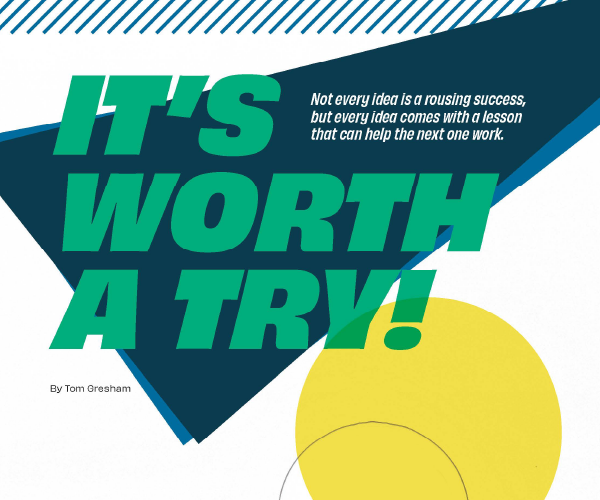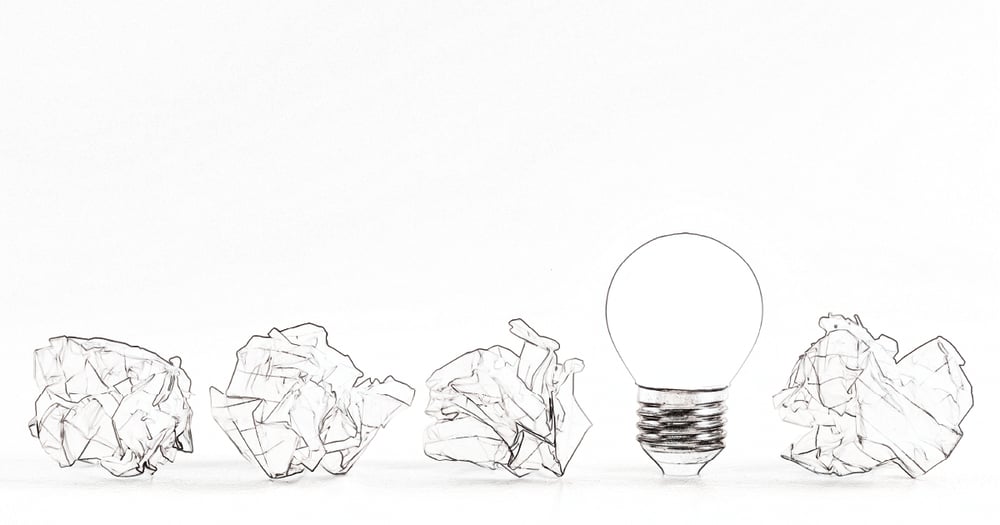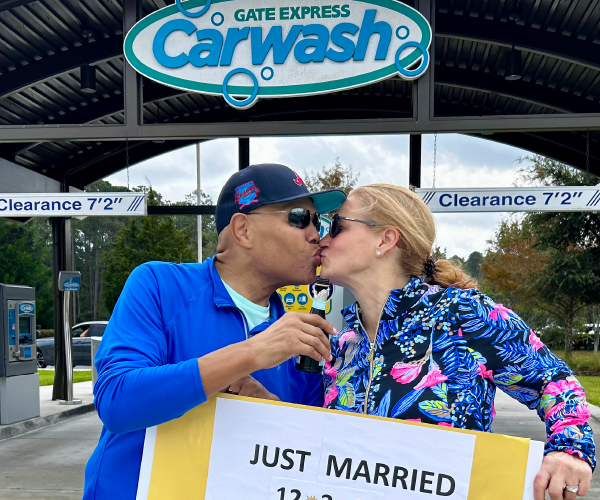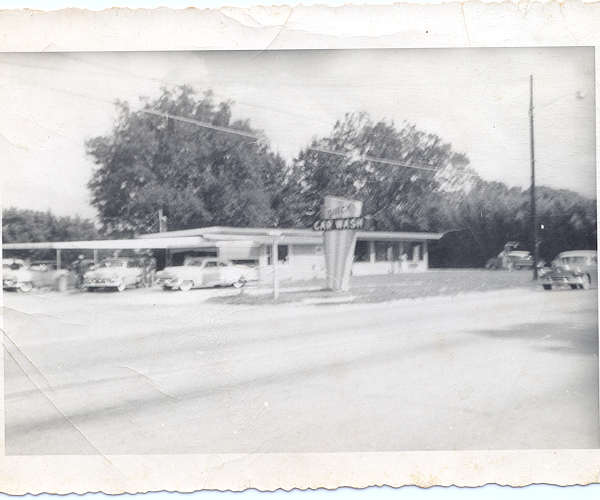
It’s Worth a Try!
January 8, 2024
9 minute ReadNot every idea is a rousing success, but every idea comes with a lesson that can help the next one work.
By Tom Gresham
When Benny’s Car Wash was founded in 1951 in Baton Rouge, La., it was a full-service car wash that also offered self-service gas. In its early days, Benny’s had a unique promotion. For every gallon of gas that a customer purchased, they would receive one free egg. So, if a customer purchased 10 gallons of gas, they would approach the cashier counter to pay, and the cashier would turn to the refrigerator behind the counter, count out 10 eggs and then hand over the eggs with the customer’s change.
“People apparently would get the biggest kick out of it,” said Justin B. Alford, owner of Benny’s Car Wash. “We didn’t do it forever — it was just a few months or so — but they definitely remembered it.”
Over the years, car washes have tried a bit of everything to attract business, improve efficiency and strengthen their services. Some ideas work, and others lack staying power. However, all those efforts — good, bad or just amusing — have proved integral to the long-term success of car washes because they represent a willingness to innovate, test new ideas and ultimately grow and progress.
“We’ve tried a ton of stuff,” said Phil DeGeratto, owner of Buddy Bear Car Wash in the Chicago area, who has been in the industry for four decades. “Some we’ve improved over time, and some we tried and tried and just had to discontinue. It’s all part of the process.”
New tech proves too new
When DeGeratto considers the advances in technology and equipment that he has seen in four decades in the car wash industry, he is awestruck. However, adopting that technology and finding the right fit for the business has not always been straightforward. Some solutions just didn’t work out.
For instance, DeGerrato said license plate recognition proved to be a false step for Buddy Bear. The occasional misreads proved challenging for staff to manage in the moment, hurting the customer experience.
“We’re always trying to make things better and offer more convenience,” DeGeratto said. “We were excited about it because we thought that if the camera could pick up the plate, then a customer could almost sign up a monthly subscription by themselves without waiting for an attendant to come out and put an RFID tag in the windshield. But I think we learned that with the few percent of problems that you will have, if you’re not prepared to handle those issues with trained staff, then the risk of having a bad experience can be high. It was messing with the customer experience, and we couldn’t accept it. It was just too hard for us to control.”
DeGeratto said sometimes it is difficult to see the potential obstacles before a project starts— and the newer the technology, the more difficult anticipating challenges will be.
“You’ve got to try things in business, but you’ve got to be cautious about maybe trying them too soon,” DeGeratto said. “It’s maybe better sometimes to wait until they’re out there a bit, and you’re sure about them.”
Refining the details in fundraising and hiring
Even ideas that prove successful in meeting their purpose can create unexpected challenges that undermine the experience. For instance, two summers ago Gleam Car Wash in Colorado held a month-long fundraiser for a program called Project Search, a job-readiness program for individuals with cognitive or physical disabilities. Gleam has a close relationship with the program, hiring nearly half of its graduating class that year, according to Emilie Baratta, Gleam’s founder. The fundraiser was done in collaboration with a large local nonprofit, teaming to match donations made by customers. The fundraiser met its goals and ultimately was a success. However, it put a surprising strain on Gleam and offered lessons for future fundraisers.
In particular, Baratta said, a month was too long for a fundraiser. Staff grew tired of pitching the fundraiser for such a long period of time, and consumers became fatigued from hearing it “over and over again” over the course of a month, she said. A more recent fundraiser for the general fund of a local children’s hospital proved successful, raising nearly $5,000, while occurring in just three days. “This created a more fun experience for everybody — both the staff and the consumer,” Baratta said.
“We learned that you really just need a shorter time period,” she said. “If you’re going to successfully invest in a fundraiser, then you want to get the time right.”
The fundraiser for Project Search was tied to a key strategic workforce effort for Gleam. At any given time, about 10-20% of Gleam’s staff members have a cognitive disability, Baratta said. However, although Gleam’s inclusive hiring program has proved highly successful with neurodiverse team members, a similar outreach effort with refugee communities did not prove sustainable. “But, there were lessons we learned from it,” Baratta said.
The first issue was that the closest refugee communities were roughly 30 minutes away from Gleam’s first location in Denver, creating problems for some potential employees who relied on public transportation. In addition, some cultural challenges arose, particularly related to a lack of understanding and respect based on gender, Baratta said. Ultimately, the program was discontinued.
“There has to be a cultural fit and a resilience within the organization that is natural for something like this to work,” Baratta said. “It has been successful with our autism outreach, because we have found positions that these individuals can succeed in. Whereas with the refugee program, we just couldn’t bridge that cultural gap. We just didn’t have the expertise for it, and it was too far afield from our mission — which is car washing.”
Baratta said operators must be ready to recognize when a new effort is not clicking and halt it rather than waste time and resources.
“If something is not working, you just have to be prepared to discontinue it,” Baratta said. “Life is full of mistakes, and you learn from those mistakes.”
Of course, putting a stop to something can just be temporary. Baratta said Gleam might try to revive the refugee hiring efforts at its new second location in Aurora, Colo., which is closer to the refugee community. If they attempt the program again, they will have the lessons of the first attempt to inform how they design and manage it this time, improving their chance at success.

Promotions
Promotions are a popular area where car washes and others try out new ideas. It also can be difficult to anticipate how customers will receive them — or, in some cases, if there are new problems that the promotions will kick up.
For instance, years ago, Buddy Bear tried a four-day guarantee offer that allowed customers to return for another wash for any reason for free within four days of a wash. DeGeratto said Buddy Bear saw too much abuse related to the deal, and it had to end the promotion. Some customers would maneuver to use the discount on different vehicles that had not yet been washed, while some employees would withhold the deal from customers, send the car through and then pocket the cash. Policing those abuses was too much work to trade off any business they gained from the campaign.
Fortunately, Alford said new promotional ideas don’t often bomb completely — not rising to the word failure — but more often are efforts that simply fail to register or more likely lack staying power. And just because they didn’t last, it didn’t mean they didn’t work.
Free eggs is not the only food-related promotion that has attracted attention for Benny’s in its history. In the late 1970s or early 1980s, Benny’s ran an ongoing campaign with the tagline, “We are nuts for dirty cars.” When customers came in for a car wash, they received free Planters peanuts in exchange. The campaign included a goofy peanut mascot. Like the eggs promotion, customers enjoyed it, but Alford said it is hard to tell if that idea and ideas like it improve business and provide a quantifiable impact. Still, fun ideas at least attract attention and help build connections with customers, and efforts like that are all part of the process of running a car wash, Alford said. In those cases, he said, the attitude often is, “That was cool for a while. We tried it. Now we’ll move onto something else.”
Indulging in innovation
Baratta said creativity is paramount to her, and the car wash field allows for space to innovate without taking major risks.
“I like things to be interesting. I like to try new things,” she said. “The profit margin in a well-run car wash allows for innovation and creativity. When we try things that don’t work, the overall dollar investment, and ultimately, my time and my staff time investment is usually pretty small. So the potential upside is great.”
Change for change’s sake is a dangerous approach, too. Alford said if car washes become too restless and intent on pursuing new ideas, then it can turn off customers.
“It’s important to try new things, but you’ve got to be careful because you can change too much and lose the reason that people came to you to begin with,” he said. “I just think everybody needs to be careful when they try radical ideas that they know what they’re getting into, and what’s the effect going to be?”
Ultimately, though, operators seem to agree with the famous summary of perseverance from writer Samuel Beckett: “Try again. Fail again. Fail better.”
“We’re always trying to improve the process and experience,” DeGerrato said. “There are so many things that we’ve tried that have helped us get to where we are now. Without that experience, we’d just be stuck in our old ways. You’ve always got to be trying to get better.”

Hit a Home Run with Your Pricing Points
Precision is not always part of a price change in the car wash field — and it might take a few tries to find the sweet spot. But, analytical models are changing this imperfect guessing game, as they aim to predict how changes to a pricing structure will affect the outcome.
“Typically, when operators change prices, they simply increase them by a dollar or two, usually in response to what a competitor is doing,” said Kayla Ivey, DRB product marketing manager.
“Optimized pricing takes into consideration what the impact of many potential pricing structures would be and determines which is going to lead to the greatest revenue,” Ivey said. “This type of strategic pricing also considers the relationship between the prices. The distance between prices greatly impacts what wash a customer will choose, so finding the optimal distance between individual price points is critical.”
While any operator can benefit from considering a pricing change, Ivey said there are some key signs that it is time for an operator to revisit their pricing: before initiating a new marketing campaign, if they haven’t evaluated their pricing in a couple of years, and if one wash package is disproportionately popular. “Statistics tell us that a number of those people will be willing to pay more,” Ivey said.
Finally, operators who are thinking about increasing prices should be sure about it — and do their research — before moving ahead.
“It’s common to want to raise prices to keep up with the competition or make more money, but before an operator does that, they should run a pricing analysis,” Ivey said. “There's often a lot more revenue to be made through optimizing prices rather than simply increasing them.”
Ivey said analytical modeling serves to target “the sweet spot” between price and customer demand by using historical data. The goal is to maximize the result of a price change.
“It recommends strategic prices based on economics and statistics and then layers in behavioral economics principles that predict how real human beings will behave,” Ivey said.








